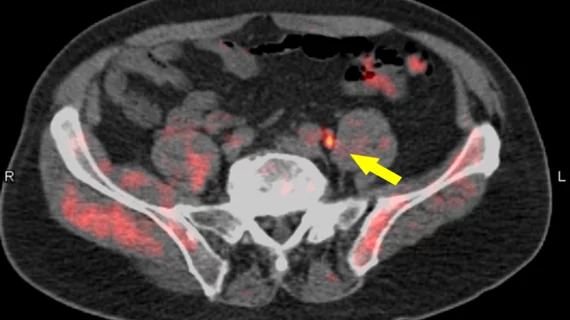Is PET/CT or multiparametric MRI best for detecting prostate cancer? New research offers guidance
When it comes to diagnosing and treating prostate cancer, both multiparametric MRI and PET/CT are invaluable imaging modalities. But which is the preferred and most efficient method? Well, that depends.
Since prostate cancer is highly treatable when detected early, detailed visualization on imaging is incredibly important. Recent research, published in the European Journal of Nuclear Medicine and Molecular Imaging, compared the use of 68Ga-PSMA PET/CT and multiparametric MRI (mpMRI) to assess their ability to detect low, intermediate and high-risk prostate cancer (PCa).
Multiparametric MRI is an easily accessible and highly accurate modality for detecting PCa. However, the authors of the study note that it has poor and heterogeneous sensitivity when it comes to local staging, which is crucial for treatment plans. In comparison, 68Ga-PSMA PET/CT has shown both high sensitivity and specificity for detecting high-risk and recurrent PCa but it lacks in intermediate and low-risk detection due to the low prevalence of extraprostatic disease and low PSA levels.
“Thus far, few studies have provided a direct comparison between mpMRI and 68Ga-PSMA PET/CT for the detection of low- and intermediate-risk primary PCa,” corresponding author Shuo Hu, with the department of nuclear medicine at Xiangya Hospital, and coauthors explained. “Consequently, no guidelines advising which modality is preferable for diagnosing the specific level of PCa have been available.”
For their study, the researchers retrospectively compared the PET/CT and mpMRI scans of 101 people who had all undergone biopsy or radical prostatectomy. All image findings were pathologically confirmed and classified according to risk.
Their work revealed that 68Ga-PSMA PET/CT was superior to mpMRI for detecting PCa in the high-risk cohort, with 97% accuracy. Conversely, mpMRI was again proven to have better detection rates in the low and intermediate-risk group.
The researchers noted that age and PSA levels also factored into their results, as patients older than 62.5 or with PSA thresholds exceeding 9.4 ng/ml were more likely to have positive 68Ga-PSMA PET/CT scans.
“These results highlighted the value of mpMRI in the initial examination of low- and intermediate-risk PCa, and the possible conditions in which PCa patients might benefit from undergoing a combination of both 68Ga-PSMA PET/CT and mpMRI,” the experts detailed.
The authors note that further research is warranted to confirm their results, but if their findings are validated, they could help providers in referring patients for biopsy or other management in the future.
You can view the full study here.

